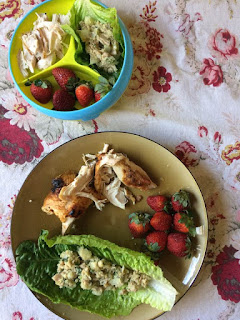My Whole30 Experience
Hello, Blogosphere. Greetings.
It has been over a month since I last wrote to you, and that means that I haven't talked to you all yet about my Whole30 experience. I did the Whole30 with my husband, my toddler son, and my parents, and Day 30 was two days ago. We are now in the last phase of the plan, where you reintroduce food groups one-by-one.
The what now?
If you aren't familiar with the Whole30 nutritional reset, it is a plan of eating only real, good food for 30 days and cutting out any of the foods that the creators of the program, Dallas and Melissa Hartwig, have determined may possibly be taking away from your optimal health.
Basically, this plan has taken me to a new level of being the real life, crunchy, foodie hippie Austinite that I was destined to be when I moved to the capital of Texas at the impressionable age of 6 months old. And I like it. Well, I am still working out the kinks, but I also have loved the journey so far.
As part of the experience, I read the Hartwigs' book, It Starts With Food: Discover the Whole30 and Change Your Life in Unexpected Ways. I took avid notes, as I do.
How does the Whole30 program decide which foods are "good foods"?
The Hartwigs propose four good food standards:
Good foods . . .
1. promote a healthy psychological response.
2. promote a healthy hormonal response.
3. support a healthy gut.
4. support immune function and minimize inflammation.
I learned so much about the complexities of nutrition and the effect of foods on our bodies by reading this book. For example, I had heard of "systemic inflammation" but never really understood why it was such a big deal.
How do you do a Whole30?
Here is an outline of the rules: For 30 days, you commit to eating
AND for those 30 days, you commit to NOT eating
- sugar (other than naturally-occuring sugar in the foods above)
- alcohol
- grains
- legumes
- dairy
- baked good or "treats"
- sulfites
- certain additives: carrageenan, corn starch, MSG, soy lecithin, sulfites
So...what were the results?
Here is a list, in no particular order, of the benefits I have noticed so far (working largely off of the "Whole30 Non-Scale Victories!" list found in The Whole30: The 30-Day Guide to Total Health and Food Freedom):
- ate a lot of delicious food and lost 10 pounds
- flatter stomach
- muscles show more, and fat seems to have diminished
- look younger (at least I think so!)
- less bloating
- less joint swelling
- This one is a big deal for me because I've had major knee injuries in the past, and still deal with the repurcussions
- more optimistic
- feel empowered, and enough so to start looking for other healthy changes I can make
- next up: I am working towards doing Project 333
- fewer sugar cravings
- a crazy new sense of control over my food, instead of the other way around (less of a slave to cravings)
- fewer carb cravings
- the ability to start getting to the root of my cravings, asking myself what I am really looking for and going to Jesus with those desires, while also seeking legitimate ways to actually meet those desires
- my cravings often seem rooted in a desire for comfort or for a feeling of fullness/wholeness
- improved body image
- improved self confidence
- higher productivity
- clearer thinking
- fall asleep more easily
- sleep much more soundly, and with less insomnia
- exception: for a phase of the Whole30, I was actually waking up regularly in the middle of the night, but seemed to be fine the next day
- energy levels are more even throughout the day
- less of a mid-day energy slump
- more energy to exercise/started exercising more
- more energy to socialize
- less need for snacks
- this depended on what I'd put on my plate at the last meal
- I am outside more
- I thought I knew how to read a food label, but now I am like a food label reading ninja!
- learned a ton about nutrition and about what constitutes healthy eating
- and now this information, which differs in some important ways from what I was taught in the past, has been backed up with some personal experience
- eat to satiety, instead of feeling like I am having to always hold back on eating too much because I am afraid of gaining weight
- no longer afraid of dietary fat
- my body is now "fat-adapted"--burning fat as fuel--according to the literature
- feel like a much better and more artistic cook
- have a much greater ability to not use food as a reward, comfort, and/or stress manager
- have a better sense of how to tell between real hunger and a craving
- have healthy coping strategies to deal with cravings
- more variety, color, vitamins, and minerals in my diet
- food, for the most part, no longer has unwanted "side effects"
- almost no food guilt or shame
- a whole new skill set regarding how to shop for "good food" in Austin
- a whole new skill set regarding how to order "good food" at a restaurant or plan for a road trip
- doing this program together has brought my family closer together
- discovered that peanut butter seems to give me a headache
- seeing a healthy domino effect:
- starting to look at our household products and consider natural alternatives
- watching documentaries about food and learning many new things
- people are bringing up food conversations with me a lot, and I am seeing how community can be formed around healthy lifestyle choices
- much greater empathy for people with food sensitivities and allergies
- greater awareness of others' restricted diets
- a renewed hope for the improvement of lifestyle-related health conditions in the people around me
- setting my son up for nutritional success starting at an early age:
- he stopped drinking apple juice all the time, and actually started sometimes asking for water
- he is eating all kinds of new vegetables and fruits
- he actually talks about liking such "non kid food" items as salad and grapefruit
- he doesn't seem to have the typical kid sugar cravings anymore--he actually saw his friend getting a cookie the other day, and ran away, disinterested
A couple of kinks:
- I way overspent on our grocery budget last month
- I am giving myself grace, assuming there is a learning curve to eating well and being thrifty at the same time
- I have spent a lot more time in the kitchen
- I have actually loved this time of becoming a much better chef, while
- at the same time, I am intentionally looking for ways to make this way of life more schedule-sustainable
My plan is to eat differently from here on out, to actually allow the Whole30 to change my life. That will take working out the kinks, and it doesn't mean that I will never eat chocolate again. I am not sure yet what it looks like. As we are going through the food group reintroduction phase, I will continue to learn more about how I want to eat going forward.
For one thing, I am much more aware of the ways that sugar sneaks into everything and really messes with our health and our ability to exercise control over our bodies. (If you want a wake up call about this, check out the documentary Sugar Coated, which can currently be watched on Netflix.)
If you want to know more, I am happy to talk about this stuff. It has been such a journey.
Because I am me, I want to end by talking about what has been most important to me on this Whole30 journey, and that is the spiritual side of the journey. I believe God has been using this experience to answer prayers of mine for healing and for help with temptations. Learning about--and practicing--good nutrition with my physical food has helped to loosen some very difficult knots of sin in my life.
Most importantly, Whole30 has brought me closer to God. It has been a tool for sanctification in the hand of a God who loves me so dearly that he only wants good things to go into me.





So inspiring! We plan to start April 24th :)
ReplyDeleteWay to go, Veronica!! I hope it is a really positive experience for you guys.
Delete